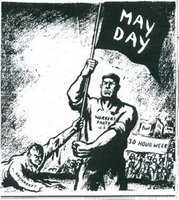Why single out Wal-Mart? When left-libertarians point out that Wal-Mart benefits from certain aggressive government interventions, and suggest that this is a reason not to cite Wal-Mart’s bidniz practices as an example of the free market at work, we are constantly asked — with the utmost innocence, even though this has been addressed over and over again every single time it has come up, generally without any response — why we are singling out
Wal-Mart for criticism, given that many other market actors also benefit from the same interventions, or from other similarly objectionable interventions. Thus, for example, when Sheldon Richman writes:
It would be impossible to sort out which profits are legit and which are not. I don't think that's the point. The point is to stop the machinery that makes illegitimate profits possible. That's the state and its various methods of privileging and burdening.
Kinsella replies:
Yes. We libertarians are of course against this. So why single out Walmart? By imprecise, lax standards, 99% of society is criminal/suspect. Where does that get us?
Let me just repeat here the same damn thing that I have repeated every time this stupid question gets asked. There are two main reasons that Wal-Mart gets singled out
here. The first reason is often because some conventionally pro-capitalist libertarian brought Wal-Mart up as an example of the free market in action. Since Mihlar brings Wal-Mart up as an example of free market success, then it would be bizarre for Roderick not to have mentioned Wal-Mart in his reply; if we are informed that Wal-Mart ought to be praised because of a characteristic X that it possesses, but it turns out that Wal-Mart does not actually possess characteristic X, then the responsible thing to do is to discuss some specifics about Wal-Mart (not every other market actor toiling in this unfree market of ours) in order to demonstrate that it hasn’t got X. This is, in fact, what actually happened in the exchange that Kinsella was supposedly commenting on.
The second reason why Wal-Mart often comes up is because Wal-Mart is a convenient example of something broader that they want to discuss — for example, the specific system of state interventions that tends to privilege big box retailers, as a group, at the expense of alternative channels of distribution, and of alternative uses of land more broadly. Of course, Wal-Mart is not the only retailer that benefits from eminent domain seizures, or from government-subsidized infrastructure for long-distance shipping, or from corporate welfare packages in the name of development.
So does Target; so does Best Buy; so does Barnes and Noble; and on, and on, down the line, for just about any strip mall chain store you could think of. But Wal-Mart is a convenient example of the broader trend, because of its unique size, scope, and name recognition. If I intend to talk about a certain kind of business model and its relationship with state power, then I hardly think it's unfair to pick a specific example to talk about, and leave the extension of the analysis as an exercise for the reader. And I hardly think it's weird or wrong to pick the most prominent and largest example of that particular business model as my specific example. When I write about bad things that the city government in Las Vegas does — for example, its fierce devotion to police brutality, economic cleansing, and using eminent domain to ensure that land gets used the way the tourism and convention industry wants it used, rather than the way that its owners do — I often go beyond simply reporting on local events, and I draw quite broad conclusions about government in general, or city governments in particular, but even then, I don’t feel compelled to mention, in the same breath, every other large city government in the world that does similarly awful things. It’s not picking on Las Vegas, or singling it out, to focus in on it as an example for the sake of discussion. And it is sheer bluster to go on accusing critics of apologists for Wal-Mart of singling out
Wal-Mart when they have explained over, and over, and over again why we are mentioning it as an example of broader trends.
Who are Wal-Mart’s competitors? This is, actually, somewhat related to the earlier question, but the issue goes deeper. When Roderick and others (Kevin Carson, especially) point out that the success of Wal-Mart’s business model depends heavily on Wal-Mart’s capacity to convince city governments to grant them corporate welfare giveaways and steal land on their behalf, or on Wal-Mart’s having access to a large network of reliable interstate roads available at a low marginal cost, which are funded in a way that heavily subsidizes those who use them for high-volume cross-country heavy trucking (which is, after all, exactly what folks like Mihlar are referring to when they extol Wal-Mart’s genious at transportation, distribution, and logistics) it is often replied that Wal-Mart is just making better use of available resources than its competitors;
that these resources are available not only to Wal-Mart but to its competitors
as well, and that, therefore, Wal-Mart’s advantages over its competitors
must be the result of something other than the availability of those resources — must, that is, be the result of greater acumen at serving its customers needs. Thus, it is argued, even though Wal-Mart depends on coercively-funded government resources for its current business model, they would (it is argued) have the same advantages (whatever those may be) that make them successful, in this an unfree market, even after the transformation of the market into a free market. Or, at the very least, they oughtn’t to be blamed for being able to successfully make use of those advantages under the present circumstances. Thus, for example, J.H. Huebert in an earlier reply to Roderick:
We are still not sure why Long believes big businesses, and Wal-Mart in particular, disproportionately benefit from the existence of government roads. No one disapproves of government roads more than we do, but the roads are there for anyone to use — the would-be competitor has just as much access to them as Wal-Mart does. Where is the unfair advantage?
And again in the comments on Roderick’s more recent post
How does the existence of government roads hamstring Wal-Mart's competitors? Anyone can use the roads.
And Stephan Kinsella, in the same thread:
Why do the subsidies help Walmart more than local mom and pop competitors? They all get goods shipped from far away
The main problem with this kind of response is that it betrays a curious sort of anti-economic blind spot about just who Wal-Mart’s competitors
are. It is true that, if we lookonly at the other actually-existing businesses that provide substitute goods and services — K-Mart, Target, Home Depot, and other big box retailers, or, expanding outward, smaller, non-chain retailers trying to sell some subset of the goods that Wal-Mart sells — then it is clear that those sorts of competitors do have access to the same kind of government privileges that Wal-Mart does; Wal-Mart just has succeeded more than they have at exploiting those privileges in such a way as to offer the goods most in demand and to offer them at lower prices. Fine. But of course, those aren’t all the competitors that Wal-Mart has — not if you consider the competitors for Wal-Mart’s inputs as well as the competitors for Wal-Mart’s outputs. In conversations like these, it is typical for conventionally pro-capitalist libertarians to act as if the business under discussion were only competing with other large chains in its sector — as if we were just picking on Wal-Mart because they’re an easy target, and rooting for Target instead — or as if it were only competing with retailers more broadly. But it’s not. The market
does not just consist of passive consumers and a handful of formalized joint-stock companies. The market is a big and messy place, and whatever you might say about the ways that Wal-Mart gains advantages over other businesses that do basically what Wal-Mart does, it is certainly clear that Wal-Mart’s advantages over competing uses of the land, labor, and infrastructure that are currently devoted to serving its business model.
Thus, for example, Wal-Mart currently enjoys preferential access to long, straight stretches of land that it needs to ship its goods in trucks. Preferential access
compared to whom? Well, not to Best Buy or Mom & Pop’s; they both can get things shipped along the same stretch. That much is seen. But what is not seen is that they — Wal-Mart, and other retailers as well — do have preferential access to those resources when compared the people who used to have, or might have had, homes, farms, parks, small businesses, car-only roads, or any number of other competitive uses of the land, which would have won out if the question were decided by homesteading and voluntary exchange, rather than by tax-funded acquisitions, government land grants, and eminent domain theft. Similarly, other big retailers also typically get at least some of the same government privileges in corporate welfare giveaways and eminent domain seizures in the name of development.
Thus, Wal-Mart may not have much advantage over, say, Target, or other fellow big chain retailers, when it come to this kind of government boodle. But those who were using, or would otherwise have used, the money or the land that the government seized, for purposes that government’s don’t count as development,
since they don’t increase property or sales tax revenue — keeping up their own homes, growing their own food, running down-market or informal-sector businesses, street-corner hustling, and the like — those people are also would-be competitors for the use of the land, money, or other resources that Wal-Mart is having the government seize and redistribute by force. And those competitors certainly are hamstrung
by the government’s redistribution of money, or its expropriation of land. We know that they are because the government is seizing it by force, and people were using it for other things, and would continue to use it for other things unless they were paid more than Wal-Mart and other development
beneficiaries pay for it in the forced sale. That is, after all, the point of eminent domain.
The problem here is that when you fetishize competition
as the struggle between similar businesses to provide substitute goods or services, and forget about the other forms of competition for scarce resources that are at issue — often uses by individual property-owners, often uses of the property that may be heavily tied up in local communities and in the informal sector, and may be governed by incentives different from those faced by large, formalized, for-profit corporations — it will, no doubt, seem incomprehensible that someone would focus on how Wal-Mart uses the roads that anyone can use.
Because the real nature of the problem is the fact that resources that are currently devoted to those roads cannot be used for what they would be used for in a freed market, which results in a big splash and some major ripples in the market distorted by that particular rock. Not because Wal-Mart alone benefits at the expense of K-Mart or Target, but rather because Wal-Mart, K-Mart, Target, and all the other big-box chain retailers — and, to a lesser extent, also locally-owned, small retailers — all benefit at the expense of somebody other than retailers, and at the expense of uses for land other than the servicing of retail sales, when the government uses force to seize long, straight strips of land, to build and maintain big highways on it, and to open up those roads, mostly without tolls and mostly without price discrimination, to anyone who cares to use it, regardless of what the marginal cost of the use may be. If those big highways weren’t being laid down according to political considerations and development
politics, and if they weren’t being heavily subsidized by coercively-seized taxes, the land might well (would probably) be used for something quite other than a large, subsidized national shipping network; and if so, those who intend to go into retail, especially those who want to go into the retailing of goods from an international network of bargain-basement suppliers, might well lose a lot of the comparative advantage that the sword of the State currently grants them over other, non-retail uses of the same scarce resources. It’s not that Wal-Mart is special here among retailers, in anything other than degree; it’s that Wal-Mart is one prominent example of a larger dynamic — the way in which State coercion, State expropriation, and State redistribution sucks scarce resources out of one sector of the economy and spits them out into another — forcibly redirecting them towards large, centralized, formal-sector cash businesses, and away from other, smaller, more localized, more informal, or less commercial uses of the resources (like housing, open space, small farming, cottage industry, local nightclubs, and other typical victims of the Development
machine). The reason that Wal-Mart is not a good example of free market dynamics is not because it somehow owes its advantages over Target to government intervention, but rather because Wal-Mart, Target, and the rest of the big retailers all owe their advantages over every other competing use of resources to the heavy hand of government. The result of removing those coercive advantages probably wouldn’t be to hurt Wal-Mart in particular in its competition with Target; but it would remove a mighty big subsidy that Wal-Mart, Target, and all the other big box retailers enjoy over alternative, non-retail uses of the same property. Which might just make for some changes in how our cities look, and in how we get around and make our livings in them.




